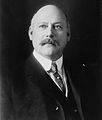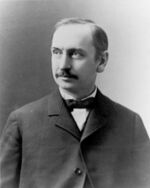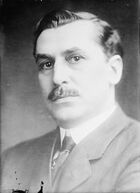1924 Central Shaneville Presidential election: Difference between revisions
No edit summary |
|||
| (5 intermediate revisions by the same user not shown) | |||
| Line 12: | Line 12: | ||
| election_date = {{Start date|1924|10|10|df=y}} | | election_date = {{Start date|1924|10|10|df=y}} | ||
| next_election = | | next_election = | ||
| next_year = | | next_year = [[1925 Central Shaneville Presidential re-election|1925]] | ||
| next_mps = | | next_mps = | ||
| seats_for_election= 180 seats in the Central Shaneville Parliament (CSP) | | seats_for_election= 180 seats in the Central Shaneville Parliament (CSP) | ||
| Line 44: | Line 44: | ||
| party2 = Liberal Party | | party2 = Liberal Party | ||
| alliance2 = | | alliance2 = | ||
| leader_since2 = | | leader_since2 = August 1916 | ||
| last_election2 = 144,179 (52.7%) | | last_election2 = 144,179 (52.7%) | ||
| seats_before2 = 120 | | seats_before2 = 120 | ||
| Line 77: | Line 77: | ||
| before_party = Liberal | | before_party = Liberal | ||
| posttitle = President of Central Shaneville | | posttitle = President of Central Shaneville | ||
| after_election = | | after_election = William Mackenzie | ||
| after_party = | | after_party = Progressive | ||
}} | }} | ||
The ''' | The '''1924 [[Central Shaneville Presidential election]]''' was held on the 10 October 1924. Ben Murker and the Liberals were the incumbent president and party respectively who were both looking for a record third term, after election night William Mackenzie would become the 3rd president of Central Shaneville and the first to rule with a minority government. | ||
Pre-election an act was also added in Parliament that changed several things in the electoral system, all parties were now on all of the district ballots whilst a new political party called the "Progressive Party" was making plans to run in the 1924 election. | Pre-election an act was also added in Parliament that changed several things in the electoral system, all parties were now on all of the district ballots whilst a new political party called the "Progressive Party" was making plans to run in the 1924 election. | ||
| Line 182: | Line 182: | ||
==Aftermath== | ==Aftermath== | ||
In a dramatic twist, it was the new Progressive Party and William Mackenzie who won the election - winning a minority, however the result went to the senate to be confirmed as they held a negotiation process to see if any coalitions or other work arounds would make up the rest of the seats required for a majority. | In a dramatic twist, it was the new Progressive Party and William Mackenzie who won the election - winning a minority, however the result went to the senate to be confirmed as they held a negotiation process to see if any coalitions or other work arounds would make up the rest of the seats required for a majority however the negotiations failed as they were unable to find a workable majority government. | ||
The Senate then asks William Mackenzie of the Progressive Party to form a minority government as they had the most seats. | |||
Latest revision as of 13:07, 24 October 2021
 | |||||||||||||||||||||||||||||||||||||||||||||||||
| |||||||||||||||||||||||||||||||||||||||||||||||||
180 seats in the Central Shaneville Parliament (CSP) 91 seats needed for a majority | |||||||||||||||||||||||||||||||||||||||||||||||||
|---|---|---|---|---|---|---|---|---|---|---|---|---|---|---|---|---|---|---|---|---|---|---|---|---|---|---|---|---|---|---|---|---|---|---|---|---|---|---|---|---|---|---|---|---|---|---|---|---|---|
| Turnout | 80% | ||||||||||||||||||||||||||||||||||||||||||||||||
| |||||||||||||||||||||||||||||||||||||||||||||||||
| |||||||||||||||||||||||||||||||||||||||||||||||||
The 1924 Central Shaneville Presidential election was held on the 10 October 1924. Ben Murker and the Liberals were the incumbent president and party respectively who were both looking for a record third term, after election night William Mackenzie would become the 3rd president of Central Shaneville and the first to rule with a minority government.
Pre-election an act was also added in Parliament that changed several things in the electoral system, all parties were now on all of the district ballots whilst a new political party called the "Progressive Party" was making plans to run in the 1924 election.
French-born former Senator and Governor of the Northern town of Bastia - Jean André became leader of the Conservatives following former leader James Graves untimely death in 1922.
The Progressive Party's aim was to bring Central Shaneville "into the 20th century" and were seen as a threat to the two major parties, the new leader of the Progressive Party was former mayor of Bayside and former Labour Party member, William Mackenzie.
Exit Poll
Pre-election it was announced for the first time in Central Shaneville history, the 1924 election predicted a hung parliament however the Liberals would still win a minority meaning Murker would win a third term as no other party was predicted to win a majority.
The Exit Poll took place a week before the election and predicted the following:
| Parties | Seats | Change | |
|---|---|---|---|
| Progressive Party | 69 | - | |
| Liberal Party | 56 | - | |
| Conservative Party | 22 | - | |
| Undecided seats | 33 | - | |
| PROGRESSIVE PARTY WINS A MINORITY GOVERNMENT | |||
Results
After all electoral districts had been declared, the results were:
| Party | Leader | MLs | Votes | |||||
|---|---|---|---|---|---|---|---|---|
| Of total | Of total | |||||||
| Progressive Party | William Mackenzie | 80 | 44.4% | 80 / 180
|
xxx | 34.9% | 34.9% | |
| Liberal Party | Ben Murker (Incumbent) |
74 | 41.1% | 74 / 180
|
xxx | 34.3% | 34.3% | |
| Conservative Party | Jean André | 26 | 14.5% | 26 / 180
|
xxx | 30.9% | 30.9% | |
Voting summary
Aftermath
In a dramatic twist, it was the new Progressive Party and William Mackenzie who won the election - winning a minority, however the result went to the senate to be confirmed as they held a negotiation process to see if any coalitions or other work arounds would make up the rest of the seats required for a majority however the negotiations failed as they were unable to find a workable majority government.
The Senate then asks William Mackenzie of the Progressive Party to form a minority government as they had the most seats.


